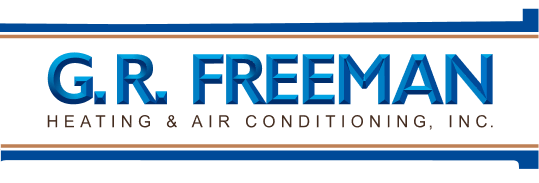Your home’s indoor air quality (IAQ) is essential for your health and comfort, especially if you or someone in your family has allergies. Poor IAQ can make allergy complaints worse and hurt your health in general. Luckily, there are effective ways to improve the air quality in your home and lower the amount of allergens in it. These suggestions can make a big difference, from using high-efficiency air screens to cleaning your home regularly. At G. R. Freeman Heating & Air Conditioning, Inc. in Evansville, IN, we want to help you optimize your home’s air quality and help you breathe easier. Learn more about transforming your home’s air quality and reducing allergies.
1. Use HEPA Filters
One of the best methods for lowering allergens in your house and improving indoor air quality is HEPA (High-Efficiency Particulate Air) filters. As much as 99.97% of particles as small as 0.3 microns, including typical allergens like dust, pet dander, pollen, and mold spores, are captured by HEPA filters. You may greatly lower the quantity of these airborne particles, which will result in cleaner air and fewer allergy symptoms, by installing HEPA filters in your air purifiers and HVAC systems. Regular maintenance and replacement are essential to guarantee that these filters continue to function properly. Including HEPA filters in your home’s air filtration system promotes a healthier living space, which enhances comfort and well-being in general.
2. Maintain a Cleaning Routine
Having a regular cleaning schedule is important for keeping germs under control and improving the quality of the air inside. When you sweep regularly with a vacuum cleaner that has a HEPA filter, you can get rid of dust, pet hair, and other airborne particles that can settle on floors and furniture. Dust mites and allergens are less likely to build up in your home if you wash your furniture, curtains, and pet bedding often.
When you dust, use a wet cloth to pick up the dust instead of spreading it around. Cleaning your air ducts and filters also stops dust and other particles from moving around your home. By making these changes to your daily routine, you can cut down on indoor pollutants by a large amount, making your home cleaner and better for you and your family.
3. Control Humidity Levels
Improving indoor humidity control is crucial to lowering allergens and enhancing indoor air quality. Sustaining humidity levels between 30% and 50% inhibits the formation of dust mites, mold, and mildew, all of which can worsen allergy symptoms and lead to poor air quality. To properly control moisture levels in moist places like bathrooms and basements, use dehumidifiers. Furthermore, make sure there is enough ventilation by installing exhaust fans in high-humidity locations and repairing any leaks that could be causing an excess of humidity. Keeping your HVAC system clean and maintained on a regular basis will also help control indoor humidity.
4. Make Sure You Have Proper Ventilation
For good indoor air quality and fewer allergens, making sure there is enough ventilation is important. By bringing in fresh air from outside, good ventilation helps dilute and get rid of internal pollutants like dust, smells, and volatile organic compounds (VOCs). To get rid of smells and wetness, use exhaust fans in places like the kitchen and bathroom, which get a lot of it. When the weather allows, open the windows to let more air in and lower the concentration of pollutants inside. Make sure that the air pipes and vents in your home’s ventilation system are clean and not blocked so that air can flow easily. Good ventilation not only makes the air better, but it also stops problems like mold growth and stuffy air, making the home healthier and more relaxing.
5. Avoid Using Harsh Chemicals
To improve the quality of the air inside and lower the risk of health problems, it is important to stay away from strong chemicals. A lot of common cleaning products have VOCs in them that can give off dangerous fumes that can make breathing problems and allergy symptoms worse. If you want to clean, choose natural or eco-friendly products that don’t have these harsh chemicals. Things like baking soda, vinegar, and lemon juice can clean surfaces well without making the air quality worse. Also, make sure you use these products in well-ventilated places to reduce your exposure to any fumes that may still be there.
Contact Us Today
To effectively manage allergy symptoms and provide a healthy living environment, indoor air quality must be improved. You may greatly lower allergens and improve the quality of the air you breathe by putting these suggestions into practice: using HEPA filters, keeping a regular cleaning schedule, regulating humidity, making sure there is adequate ventilation, and selecting non-toxic cleaning solutions. These actions enhance general well-being in addition to resolving allergy-related problems.
Time to purify your air? Contact G. R. Freeman Heating & Air Conditioning, Inc. today for comprehensive IAQ services designed to optimize your home’s air quality. We also offer heating, air conditioning, and ductwork services in addition to our indoor air quality services. Breathe easier and enjoy a cleaner, cozier home with our professional support.








